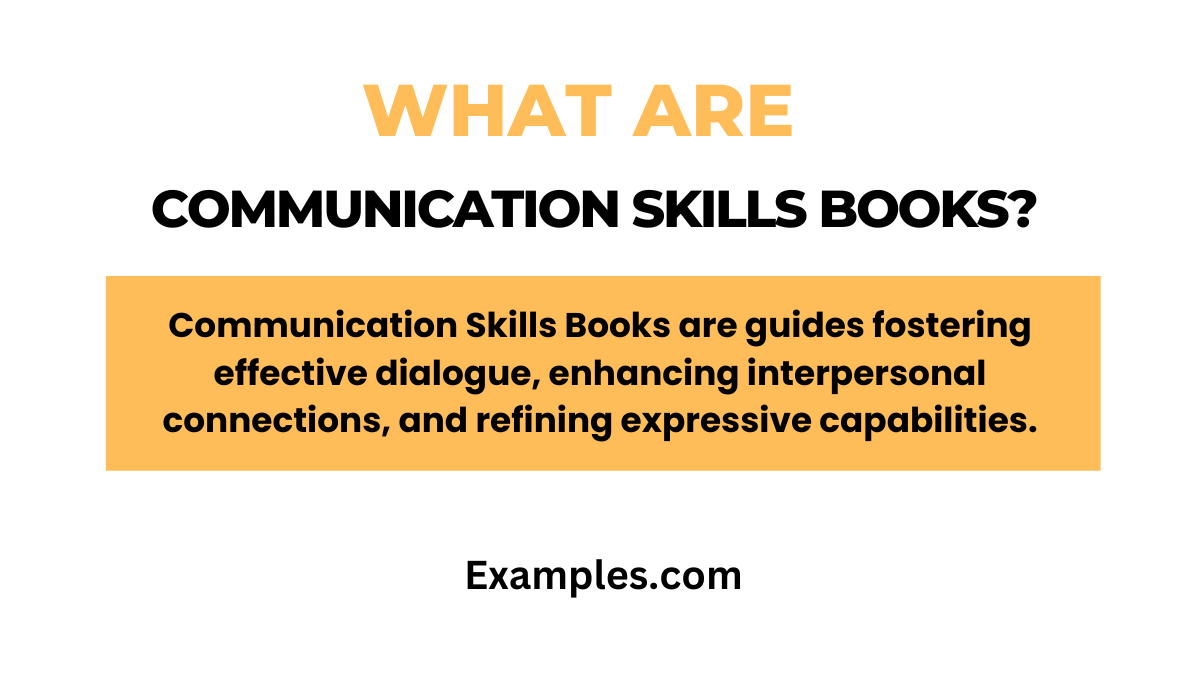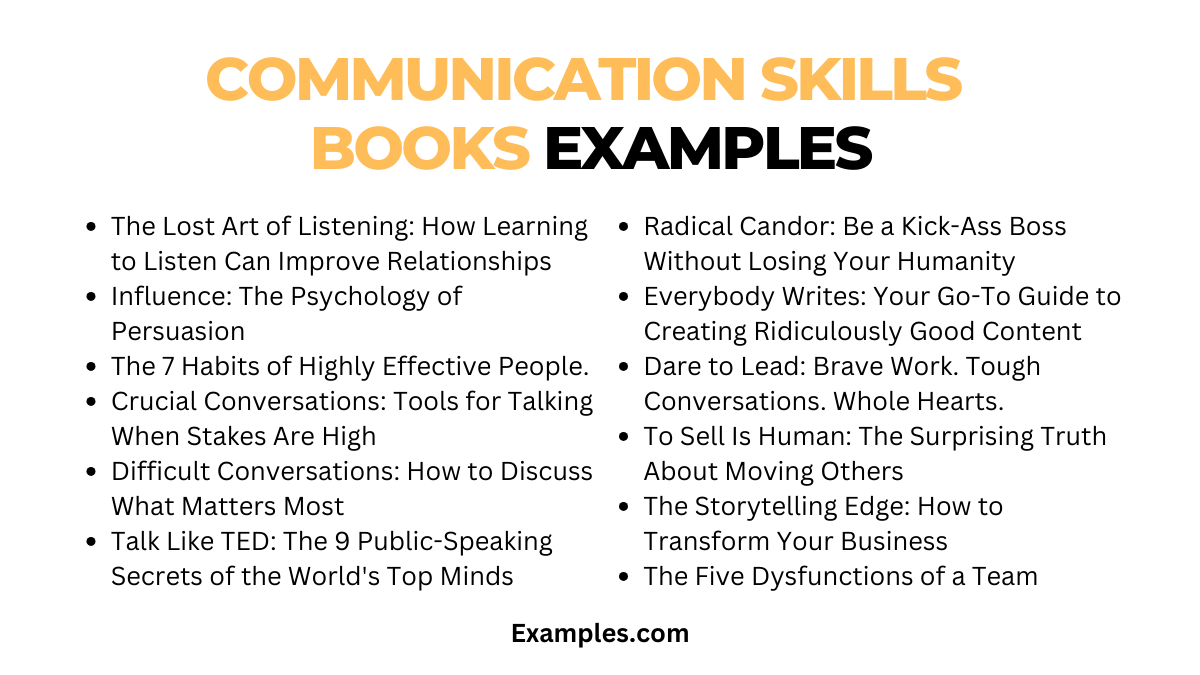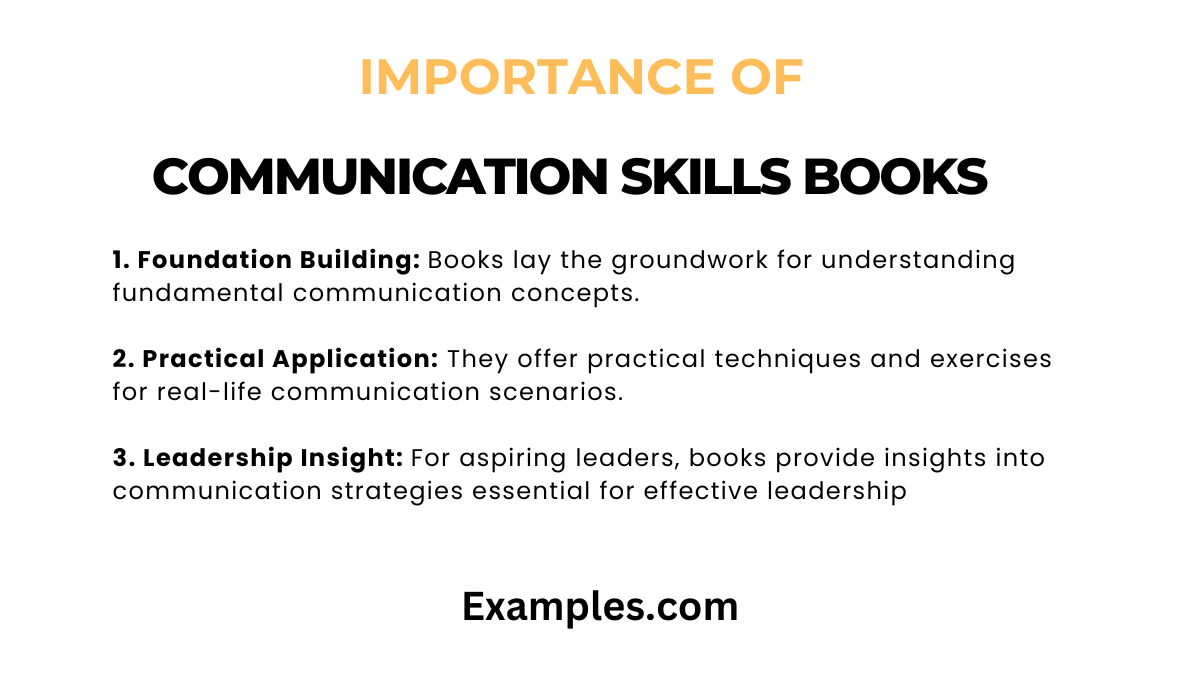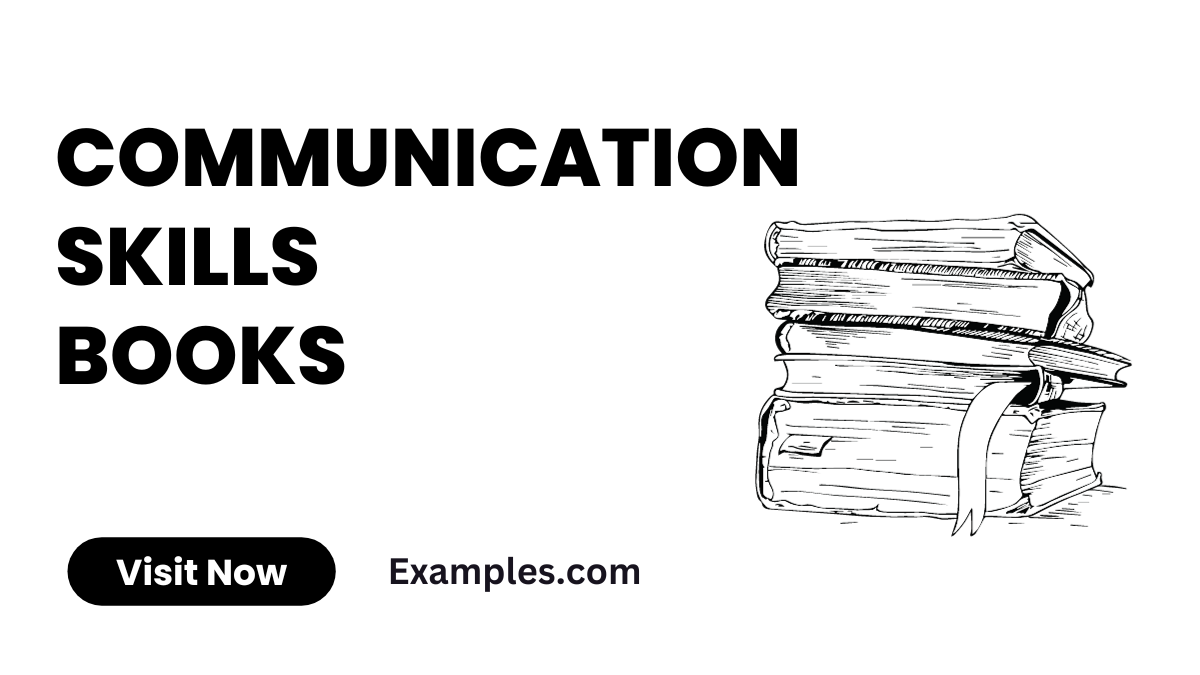29+ Communication Skills Books Examples
Enhance your communication prowess with a comprehensive exploration of Communication Skills Books. Discover the power of words, nonverbal cues, and effective strategies to navigate various scenarios. Uncover a curated selection of books that illuminate the art of impactful communication, offering real-world examples and actionable insights. Elevate your interpersonal skills, articulate ideas with clarity, and foster meaningful connections through the wisdom embedded in Communication Skills Books.
What are Communication Skills Books?

Communication Skills Books are invaluable resources designed to impart knowledge and refine the ability to convey thoughts, ideas, and emotions effectively. These books delve into verbal and nonverbal communication, offering practical advice, exercises, and real-life examples to enhance overall communication proficiency. Whether in personal or professional realms, these books serve as guides to navigate diverse communication challenges, promoting clarity, understanding, and connection.
Communication Skills Books Examples

- “How to Win Friends and Influence People” by Dale Carnegie: Unveil interpersonal success secrets with timeless principles for lasting connections through effective communication.
- “Influence: The Psychology of Persuasion” by Robert B. Cialdini: Explore the psychology behind persuasion, unveiling principles influencing decisions for effective communication strategies.
- “The 7 Habits of Highly Effective People” by Stephen R. Covey: Cultivate effectiveness with principles for personal and professional success, enhancing communication skills for collaboration.
- “Crucial Conversations: Tools for Talking When Stakes Are High” by Kerry Patterson, Joseph Grenny, Ron McMillan, Al Switzler: Navigate high-stakes discussions skillfully with tools for managing emotions and fostering positive outcomes.
- “Difficult Conversations: How to Discuss What Matters Most” by Douglas Stone, Bruce Patton, Sheila Heen: Handle tough talks with finesse, providing insights and strategies for navigating challenging conversations with understanding and resolution.
- “Talk Like TED: The 9 Public-Speaking Secrets of the World’s Top Minds” by Carmine Gallo: Master public speaking with TED Talk secrets, offering tips for captivating communication resonating with any audience.
- “Atomic Habits” by James Clear: Transform habits through effective self-dialogue, exploring how tiny changes lead to remarkable results.
- “Mindset: The New Psychology of Success” by Carol S. Dweck: Foster a growth mindset, encouraging positive self-talk and communication for personal development.
- “Never Split the Difference” by Chris Voss: Master negotiation through effective communication, sharing tactics for successful negotiations.
- “The Art of Communicating” by Thich Nhat Hanh: Embrace mindful communication, exploring the power of deep listening and loving speech for compassionate communication.
- “Drive: The Surprising Truth About What Motivates Us” by Daniel H. Pink: Uncover the science of motivation, providing insights for effective communication in leadership and collaboration.
- “The Charisma Myth: How Anyone Can Master the Art and Science of Personal Magnetism” by Olivia Fox Cabane: Enhance personal magnetism, delving into the elements of charisma with communication strategies for influence.
- “Radical Candor: Be a Kick-Ass Boss Without Losing Your Humanity” by Kim Scott: Navigate candid conversations in leadership, emphasizing honest and empathetic communication.
- “Everybody Writes: Your Go-To Guide to Creating Ridiculously Good Content” by Ann Handley: Refine writing skills for effective communication with actionable tips for compelling content.
- “Dare to Lead: Brave Work. Tough Conversations. Whole Hearts.” by Brené Brown: Embrace vulnerability in leadership, exploring courageous leadership with open communication and trust building.
- “To Sell Is Human: The Surprising Truth About Moving Others” by Daniel H. Pink: Learn the art of selling ideas, gaining insights into persuasive communication for influence.
- “The Five Dysfunctions of a Team” by Patrick Lencioni: Address team dynamics through effective communication, identifying dysfunctions and promoting cohesive teams.
- “Leaders Eat Last: Why Some Teams Pull Together and Others Don’t” by Simon Sinek: Explore leadership and communication, emphasizing trust and communication in thriving team environments.
- “Deep Work: Rules for Focused Success in a Distracted World” by Cal Newport: Enhance focus through intentional communication strategies, minimizing distractions for deep work.
- “The Power of Habit: Why We Do What We Do in Life and Business” by Charles Duhigg: Understand the science of habits, exploring the role of communication in shaping and transforming habits for success.
- “Crucial Conversations: Tools for Talking When Stakes Are High” by Kerry Patterson, Joseph Grenny, Ron McMillan, and Al Switzler: Master high-stakes discussions with communication tools for effective navigation.
- “The Art of Communicating” by Thich Nhat Hanh: Discover mindful communication, gaining insights into compassionate and mindful communication for meaningful connections.
- “Influence: The Psychology of Persuasion” by Robert B. Cialdini: Unlock the secrets of influence, exploring the psychology behind persuasive communication for valuable insights.
- “Never Split the Difference: Negotiating As If Your Life Depended On It” by Chris Voss: Master negotiation through effective communication, sharing tactics for success in high-stakes negotiations.
- “Words That Change Minds: The 14 Patterns for Mastering the Language of Influence” by Shelle Rose Charvet: Decipher patterns of influence, exploring language patterns for understanding and leveraging influential communication.
- “Thinking, Fast and Slow” by Daniel Kahneman: Understand cognitive biases in communication, shedding light on effective communication by addressing cognitive biases.
- “Made to Stick: Why Some Ideas Survive and Others Die” by Chip Heath and Dan Heath: Craft memorable messages, revealing principles for creating ideas that stick through effective communication.
- “Talk Like TED: The 9 Public-Speaking Secrets of the World’s Top Minds” by Carmine Gallo: Refine public speaking skills, analyzing TED Talks for insights and strategies to elevate communication and presentation abilities.
- “The Storytelling Edge: How to Transform Your Business, Stop Screaming into the Void, and Make People Love You” by Joe Lazauskas and Shane Snow: Harness the power of storytelling, illustrating the impact of storytelling in business communication with practical techniques.
- “The Lost Art of Listening: How Learning to Listen Can Improve Relationships” by Michael P. Nichols: Cultivate active listening, exploring the lost art of listening and its transformative impact on relationships and effective communication.
Communication Skills Books Examples at School
Enhance students’ communication prowess with these influential reads. Navigate school interactions confidently and build lasting connections.
- “How to Win Friends and Influence People” (Dale Carnegie): Cultivate social skills, boldly introducing oneself for connections.
- “Speak with Confidence” (Dianna Booher): Excel in presentations, articulating ideas clearly for captivation.
- “The 7 Habits of Highly Effective Teens” (Sean Covey): Equip teens with effective habits, promoting active listening.
- “Crucial Conversations for Teens” (Patterson, Grenny, etc.): Prepare for critical talks, navigating sensitive topics respectfully.
- “The Grown-Up’s Guide to Teenage Humans” (Josh Shipp): Decode teenage communication, fostering meaningful conversations.
- “How to Talk So Teens Will Listen & Listen So Teens Will Talk” (Faber, Mazlish): Bridge generation gaps, encouraging assertive expression.
- “The Art of Communicating for Teens” (Elizabeth P. Cipolla): Hone communication artistry, expressing opinions assertively.
- “Beyond Texting” (Debra Fine): Nurture face-to-face skills, maintaining confident eye contact.
- “Teenagers 101” (Rebecca Deurlein Ed.D.): Understand teenage needs, fostering supportive dialogue.
- “The Power of Positive Communication” (Helio Fred Garcia): Instill positivity, empowering teens to create a supportive atmosphere.
Communication Skills Books Examples at Work
Elevate workplace communication with these impactful reads. Foster collaboration, effective leadership, and a positive organizational culture.
- “Leadership and Self-Deception” (Arbinger Institute): Transform dynamics with empathetic leadership.
- “Crucial Conversations” (Patterson, Grenny, etc.): Navigate high-stakes discussions for constructive resolutions.
- “Radical Candor” (Kim Scott): Embrace candid communication while maintaining empathy.
- “Dare to Lead” (Brené Brown): Foster courageous leadership, enhancing team communication.
- “The Five Dysfunctions of a Team” (Lencioni): Address team dysfunctions for better collaboration.
- “Difficult Conversations” (Stone, Patton, Heen): Navigate challenging dialogues, fostering understanding.
- “The Art of Communicating” (Thich Nhat Hanh): Embrace mindful communication for improved relations.
- “Influence” (Robert B. Cialdini): Master the art of persuasive communication.
- “Everyone Communicates, Few Connect” (John C. Maxwell): Tailor communication for stronger interpersonal relationships.
- “Drive” (Daniel H. Pink): Understand motivation, encouraging effective communication.
Communication Skills Books Examples for Students
Communication skills are crucial for students’ academic success and future careers. Explore these books that offer valuable insights and practical tips to enhance communication abilities.
- “How to Win Friends and Influence People” by Dale Carnegie: Initiate conversations for lasting connections and friendships.
- “Crucial Conversations for Teens” by Michelle Brody: Practice open communication with parents for a healthier relationship.
- “The 7 Habits of Highly Effective Teens” by Sean Covey: Develop proactive habits for academic and extracurricular excellence.
- “Mindset: The New Psychology of Success” by Carol S. Dweck: Cultivate a growth mindset through positive communication about challenges.
- “Talk Like TED for Teens” by Carmine Gallo: Elevate presentations with storytelling in school projects.
- “Leadership for Introverts” by Ty Belknap: Leverage quiet strength for effective leadership through thoughtful communication.
- “Speak Like Churchill, Stand Like Lincoln” by James C. Humes: Master persuasive communication for impactful presentations and debates.
- “Atomic Habits” by James Clear: Enhance study habits through clear self-communication on academic goals.
- “Emotional Intelligence 2.0” by Travis Bradberry and Jean Greaves: Navigate social dynamics with emotional intelligence and empathetic communication.
- “The Art of Possibility” by Rosamund Stone Zander and Benjamin Zander: Foster a collaborative class environment through a mindset of possibility and open communication.
What are Communication Skills Books for Personality Development?
Communication skills books for personality development serve as invaluable resources in refining and enhancing various facets of one’s character. These books delve into the intricacies of effective communication, emotional intelligence, and interpersonal relationships. They offer practical insights, actionable strategies, and real-life examples to help readers cultivate traits that contribute to a well-rounded personality. Topics covered may include assertiveness, active listening, empathy, conflict resolution, and overall social acumen.
What is Included in Communication Skills Books?
Communication skills books encompass a wide array of content, catering to diverse audiences with varying needs and objectives. The following elements are commonly found in these books:
- Foundational Concepts: Books introduce fundamental communication concepts for a solid understanding.
- Practical Techniques: Readers find exercises improving real-life communication skills.
- Case Studies and Examples: Books use real-world instances to illustrate effective strategies.
- Emotional Intelligence: Explore how emotional intelligence impacts relationships and communication.
- Interpersonal Skills: Cover active listening, conflict resolution, assertiveness, and empathy.
- Adaptability: Address adaptability in navigating evolving communication landscapes.
- Leadership Communication: Insightful strategies for effective leadership communication.
- Cultural Competence: Emphasize respectful communication across diverse cultures.
Why are Communication Skills Books Important?

- Foundation Building: Books lay the groundwork for understanding fundamental communication concepts.
- Practical Application: They offer practical techniques and exercises for real-life communication scenarios.
- Illustrative Examples: Many books use case studies and examples to showcase effective communication strategies.
- Emotional Intelligence: Books explore the influence of emotional intelligence on communication and relationships.
- Interpersonal Mastery: Content covers vital interpersonal skills like active listening, assertiveness, and conflict resolution.
- Adaptability Guidance: In a changing world, books address adaptability in navigating evolving communication landscapes.
- Leadership Insight: For aspiring leaders, books provide insights into communication strategies essential for effective leadership.
Tips for Effective Communication Skills Books
- Practical Exercises: Choose books with actionable exercises for hands-on skill development.
- Examples and Case Studies: Look for books that use real-world examples and case studies for practical illustration.
- Emphasis on Emotional Intelligence: Prioritize books that delve into the crucial role of emotional intelligence in communication.
- Diverse Interpersonal Skills: Select books that cover a spectrum of interpersonal skills, including active listening and empathy.
- Guidance on Adaptability: Choose books that provide insights on adapting to evolving communication landscapes.
- Leadership-Focused Content: Consider books that offer communication strategies tailored for effective leadership.
- Promotion of Cultural Competence: Emphasize books that teach respectful communication across diverse cultural backgrounds.
- Insights on Feedback: Seek books that provide valuable insights on giving and receiving constructive feedback.
- Recognition of Foundational Concepts: Understand the importance of books that build a foundation by introducing fundamental communication concepts.
- Holistic Understanding: Explore books that provide a comprehensive understanding of communication skills, addressing various aspects of personal and professional interactions.
In conclusion, exploring the world of communication skills through these recommended books can significantly enhance your ability to connect, persuade, and succeed in various aspects of life. The knowledge and insights gained from these literary gems serve as valuable tools for personal and professional growth.
To delve further into the realm of communication and its impact on our lives, you can visit the American Communication Association. This authoritative source provides a wealth of research and resources in the field of communication studies. Additionally, explore the extensive collection of communication-related courses and materials available at Coursera, offered by top universities and institutions worldwide. These external links from high-authority sources will further enrich your understanding of communication skills.



